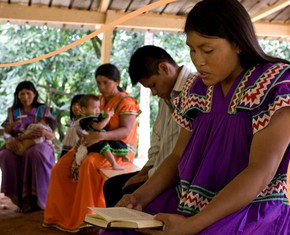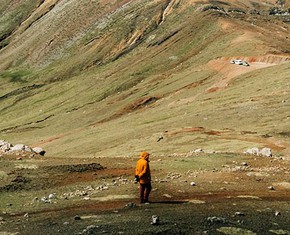The views expressed in our content reflect individual perspectives and do not represent the authoritative views of the Baha'i Faith.
I was 17 years old when I fell in love with the Baha’i teachings. I wanted, more than anything, to help bring Baha’u’llah’s peaceful, unifying principles into being in the world. But how?
The Baha’i writings call for world peace. The Baha’i writings call for the oneness of all religions. The Baha’i writings call for an end to all prejudice and hatred. The Baha’i writings call for the equality of the sexes, for freedom of expression, for the independent investigation of the truth, for representative global governance, for the agreement of science and spirituality, for harmony and unity and human cooperation.
I loved those powerful principles, but even more, I loved the way they came about, brought into the world’s consciousness by a prisoner, an exiled prophet, a persecuted messenger newly sent to all humanity by a compassionate Creator.
RELATED: How I Found the Baha’i Faith
Baha’u’llah – which means “the Glory of God” – praised the prophets who had come before him, and considered them all holy teachers in the same successive spiritual school. He claimed no exclusivity. He made no threats. He simply called everyone back to the consciousness of a benevolent universal Mystery. He maintained that each religion revealed to humankind brought the truth for its time, and that the core teachings of those faiths – love, kindness, prayer, meditation, and an abiding belief in human goodness rooted deep in our souls – remained perpetually true:
Ye are the dawning-places of the love of God and the daysprings of His loving-kindness. Defile not your tongues with the cursing and reviling of any soul, and guard your eyes against that which is not seemly. … Be not the cause of grief, much less of discord and strife. The hope is cherished that ye may obtain true education in the shelter of the tree of His tender mercies and act in accordance with that which God desireth. Ye are all the leaves of one tree and the drops of one ocean.
I wanted, desperately, to carry those beautiful teachings into reality. Facing war, I desired peace. Facing hatred, I yearned for love. Facing ugliness and pain, I wanted beauty and healing in the world. In the Baha’i teachings, I found the prescription for that healing – the most cogent, comprehensive combination of societal remedies I had ever encountered.
It took me a while, though. I first found out about the Baha’i Faith and its messenger Baha’u’llah when I was 15. A reader, I immediately immersed myself in the Baha’i writings, and since Baha’u’llah and his successor Abdu’l-Baha and his successor Shoghi Effendi had written so many volumes packed with so much deep wisdom and insight, my reading in itself became a journey of discovery. One quotation from a single sentence of Baha’u’llah’s would lead me down a path of intense curiosity, and that path might snowball into a hundred questions, answered and multiplied into more questions in those voluminous and luminous writings.
Soon, I recognized the Baha’i teachings as right and true. As I read Baha’u’llah’s mystical and practical writings, they struck me at a level far beyond my adolescent intellectual capacities and comprehension, but they also resonated in my spirit as undeniable truths. I knew, somewhere in my soul, that this was the voice of eternity speaking.
RELATED: When You Become a Baha’i
Oh, I tried to question my feelings. Not a joiner, reluctant to make any commitment to anything beyond myself, at some level I didn’t want to adhere to any religion, because I saw religion as a cage. Raised in a Lutheran church, frightened as a child by the stern and unforgiving judgment I found there, I had my own built-in prejudices against any form of formal Faith. This new religion, though, had no such strictures, no clergy, no hellfire and damnation, no punitive principles. The God Baha’u’llah’s writings portrayed seemed filled with compassion and love: “O son of being! Love Me, that I may love thee. If thou lovest Me not, My love can in no wise reach thee.”
I felt conflicted. I talked to a friend, a wise older Baha’i, about what I should do. “You should follow your heart,” he said, without pressure or coercion of any kind. “It’s your decision – no one else can make it for you.”
“Okay, so what does it take to become a Baha’i?” I asked him. I imagined a long process that included things like initiations, classes, baptisms, ceremonies, or some elaborate ritual.
“All it takes,” he said, “is to believe in Baha’u’llah – in who he was and what he taught.”
“That’s it?” I was a little dumbfounded. “But I believe that now,” I said.
“Then you’re already a Baha’i,” he said simply.
The next morning, after sleeping on it, I filled out and signed a Baha’i declaration card, which meant that I had decided to enroll in the Baha’i community and do what I could to follow Baha’u’llah’s teachings – to become a believer, a participant rather than an observer, someone with an expressed commitment to join a worldwide community trying its best to bring about love and unity in the world.
In the years since I first recognized Baha’u’llah and decided to do what I could to follow his teachings, my life has taken on an entirely new light. I’ve seen reality in fresh and beautiful ways. I’ve fought my own spiritual battles, sometimes badly and sometimes successfully, but I’ve waged those battles in the context of a warm, supportive global community of like-minded family. I’ve encountered wonderful oneness. I’ve learned things I could not have learned any other way. I’ve felt enormous comradery and cohesion among my fellow Baha’is as we all work toward a world without war and fear and inequity. I’ve experienced great joy. I hope, looking back on my life, that I’ve enriched others the same way they’ve enriched me, and I hope, as well, that those of you reading this will contemplate Baha’u’llah’s remarkable claims and make your own decisions about them, too.
















Comments
Sign in or create an account
Continue with Googleor